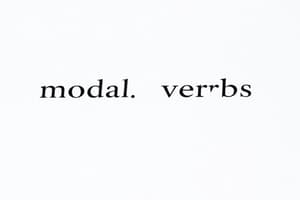Podcast
Questions and Answers
What does the modal verb 'can' indicate in the sentence 'She can ski very well'?
What does the modal verb 'can' indicate in the sentence 'She can ski very well'?
- Possibility
- Permission
- Obligation
- Ability (correct)
In the sentence 'You must have a driving licence', what is the function of the modal verb 'must'?
In the sentence 'You must have a driving licence', what is the function of the modal verb 'must'?
- Probability
- Willingness
- Advice
- Obligation (correct)
What is the meaning of 'must' in the expression 'They must be in love!'?
What is the meaning of 'must' in the expression 'They must be in love!'?
- Permission
- Willingness
- Certainty (correct)
- Ability
What does the modal 'should' indicate in the sentence 'You should stop seeing him'?
What does the modal 'should' indicate in the sentence 'You should stop seeing him'?
In the sentence 'It might snow tonight', which meaning does the modal verb 'might' convey?
In the sentence 'It might snow tonight', which meaning does the modal verb 'might' convey?
Which modal verb would appropriately replace 'is able to' in the sentence 'Only gym users are able to park here'?
Which modal verb would appropriately replace 'is able to' in the sentence 'Only gym users are able to park here'?
What does the expression 'You don't have to drive through a red light' imply?
What does the expression 'You don't have to drive through a red light' imply?
What is the correct rephrasing using a modal for 'He finally gave up smoking'?
What is the correct rephrasing using a modal for 'He finally gave up smoking'?
What does 'mustn't' express?
What does 'mustn't' express?
Which phrase is used to express strong advice?
Which phrase is used to express strong advice?
What grammatical structure indicates future possibility?
What grammatical structure indicates future possibility?
What conveys an informal obligation in British English?
What conveys an informal obligation in British English?
Which modal verb is typically used to express ability in the past?
Which modal verb is typically used to express ability in the past?
Which expression can replace 'get in touch'?
Which expression can replace 'get in touch'?
What does 'You must try harder!' imply?
What does 'You must try harder!' imply?
Which of these indicates mild obligation?
Which of these indicates mild obligation?
How do you express that something is not required?
How do you express that something is not required?
Which verb form indicates a fulfilled ability in a specific past event?
Which verb form indicates a fulfilled ability in a specific past event?
What is the stronger expression of advice that implies a threat for non-compliance?
What is the stronger expression of advice that implies a threat for non-compliance?
What does 'can' express when used in context of permission?
What does 'can' express when used in context of permission?
Which phrase indicates that something is allowed?
Which phrase indicates that something is allowed?
How can you indicate a past ability that is no longer present?
How can you indicate a past ability that is no longer present?
Which modal verb expresses a strong likelihood that something will happen?
Which modal verb expresses a strong likelihood that something will happen?
What does the modal verb 'must' indicate about a situation?
What does the modal verb 'must' indicate about a situation?
Which sentence correctly uses the verb 'should'?
Which sentence correctly uses the verb 'should'?
Which modal verb is used to make polite requests?
Which modal verb is used to make polite requests?
In which of the following sentences is 'might' used correctly?
In which of the following sentences is 'might' used correctly?
Which modal verb expresses a negative refusal?
Which modal verb expresses a negative refusal?
What is the correct negative form for 'can' in a request?
What is the correct negative form for 'can' in a request?
Which of these expresses an obligation?
Which of these expresses an obligation?
In the context of modals, which sentence implies permission?
In the context of modals, which sentence implies permission?
Which statement about modal auxiliary verbs is true?
Which statement about modal auxiliary verbs is true?
Which of these sentences uses 'could' to express ability?
Which of these sentences uses 'could' to express ability?
Which modal verb indicates a future action with certainty?
Which modal verb indicates a future action with certainty?
What is the correct negative form of the sentence 'He can understand Spanish'?
What is the correct negative form of the sentence 'He can understand Spanish'?
Which statement about 'might' is correct?
Which statement about 'might' is correct?
Flashcards
Modal Verb 'can'
Modal Verb 'can'
Expresses ability or permission.
Modal Verb 'must'
Modal Verb 'must'
Expresses obligation or strong probability.
Modal Verb 'should'
Modal Verb 'should'
Expresses advice or recommendation.
Modal Verb 'may/might'
Modal Verb 'may/might'
Signup and view all the flashcards
Modal Verb 'will/won't'
Modal Verb 'will/won't'
Signup and view all the flashcards
Modal Verb 'have to/has to'
Modal Verb 'have to/has to'
Signup and view all the flashcards
Modal Verb 'ought to'
Modal Verb 'ought to'
Signup and view all the flashcards
Modal Verb 'better'
Modal Verb 'better'
Signup and view all the flashcards
Modal auxiliary verbs
Modal auxiliary verbs
Signup and view all the flashcards
Modal verbs: Probability
Modal verbs: Probability
Signup and view all the flashcards
Will/Won't
Will/Won't
Signup and view all the flashcards
Must/Can't
Must/Can't
Signup and view all the flashcards
Should
Should
Signup and view all the flashcards
May/Might
May/Might
Signup and view all the flashcards
Willingness/Refusal
Willingness/Refusal
Signup and view all the flashcards
Request
Request
Signup and view all the flashcards
Past tense of modals
Past tense of modals
Signup and view all the flashcards
Future tense of modals
Future tense of modals
Signup and view all the flashcards
Appointment
Appointment
Signup and view all the flashcards
Cancel appointment
Cancel appointment
Signup and view all the flashcards
Phrasal verb "Get"
Phrasal verb "Get"
Signup and view all the flashcards
Phrasal verbs particle types
Phrasal verbs particle types
Signup and view all the flashcards
Phrasal Verb Examples
Phrasal Verb Examples
Signup and view all the flashcards
Modal Verb: Could
Modal Verb: Could
Signup and view all the flashcards
Modal Verb: Couldn't (Negative)
Modal Verb: Couldn't (Negative)
Signup and view all the flashcards
Ability: Can/Could
Ability: Can/Could
Signup and view all the flashcards
Ability: Be Able To
Ability: Be Able To
Signup and view all the flashcards
Ability: Was/Managed To
Ability: Was/Managed To
Signup and view all the flashcards
Giving Advice: Should/Ought To
Giving Advice: Should/Ought To
Signup and view all the flashcards
Strong Advice: Had Better
Strong Advice: Had Better
Signup and view all the flashcards
Obligation: Must/Have To
Obligation: Must/Have To
Signup and view all the flashcards
Obligation: Have Got To
Obligation: Have Got To
Signup and view all the flashcards
Obligation: Don't Have To
Obligation: Don't Have To
Signup and view all the flashcards
Obligation: Mustn't
Obligation: Mustn't
Signup and view all the flashcards
Permission: May/Can/Could
Permission: May/Can/Could
Signup and view all the flashcards
Permission: Can/Be Allowed To
Permission: Can/Be Allowed To
Signup and view all the flashcards
Study Notes
Modal Verbs and Related Verbs
-
Definition: Modal auxiliary verbs (can, could, may, might, shall, should, will, would, must, ought to) are used frequently to express various meanings, including ability, permission, obligation, suggestion, necessity, a promise, and intention. They can also express degrees of certainty, probability, or possibility.
-
Characteristics:
-
No "s" in the third person singular (e.g., He can swim).
-
No auxiliary "do/does" in questions (e.g., May I ask a question?).
-
No "don't/doesn't" in negatives (e.g., You shouldn't tell lies).
-
Followed by an infinitive without "to" (except "ought to").
Modal Verbs of Probability
- Degree of Certainty: Modals expressing probability range from high (will) to low (might/could).
- Will/Won't: Express strong prediction about the future, or assumptions about the present based on known routines/character.
- Must/Can't: Express logical interpretations or strong deductions. "Must" is less certain than "will". "Can't" expresses the opposite.
- Should: Expresses expectations based on reasonable assumptions and hopes of the speaker for an event to happen.
- May/Might/Could: Express the possibility that something might happen, they are less emphatic in comparison to "will" or "must".
Willingness and Refusal
- Will/Won't: Express willingness (I'll help you) or refusal (She won't get up).
- Shall: Used in questions about willingness (Shall I give you a hand?).
- Wouldn't: Expresses past refusal.
Requests
- Several modals (can, could, will, would) can be used to express requests.
Ability
- Can/Could: Express present or past ability.
- Be able to: Used for expressing ability in a wider range of tenses and contexts (e.g., I've never been able to, I'd love to be able to, you'll be able to).
- Was/Were able to/Managed to: Used to express past ability in specific situations or on a single occasion in the past instead of using "could".
Advice
- Should/Ought to: Express mild obligation or advice.
- Had better: Gives stronger advice, or directives with slightly more emphasis.
Obligation
- Must: Expresses strong obligation; often used in a formal context or instructions.
- Have to/Have got to: Expresses obligation, based on rules, laws, or the instructions of another person.
- Mustn't: Expresses negative obligation (prohibition).
- Don't have to: Expresses the absence of obligation.
Permission
- May/Can/Could: Used to ask for permission.
- Can/Could/Be allowed to: Used for talking about permission in general or in various tenses.
- Are/am/is allowed to/ permitted to: Expresses permission and prohibition generally or in past/future contexts.
Related Verb Forms
- Other related verbs (e.g., be bound to, be likely to, be required to, be supposed to) express similar ideas to modal verbs.
Other Notes
- Examples of modal usage in various situations (e.g., Asking for permission to enter a gym, explaining probabilities, providing advice) are given in the text to illustrate these points and show different meanings.
- The text also includes examples of how to put modal verbs into past and future tenses.
Studying That Suits You
Use AI to generate personalized quizzes and flashcards to suit your learning preferences.




